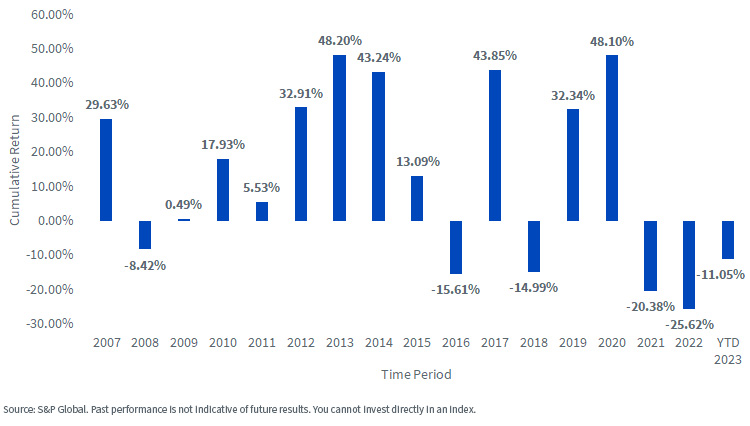Is it Time for Biotech?


Few areas have been as performance-challenged as biotechnology stocks in the last three years. Sometimes it makes sense to search for opportunity among the areas that recently performed the worst.
Double-Digit Negative Returns for Three Years?
The S&P Biotechnology Select Industry Index had a return worse than -10% in 2021 and 2022, and recognizing that a lot of 2023 is on the books (through November 24, 2023), 2023 may be the third full year in a row when this occurs. Looking back 10 years, this set of stocks has been volatile, but such negative returns three years in a row is unique.
To put this recent drawdown into context, $100 invested at the end of 2020 and simply held through those returns would have left a bit more than $52 at the market’s close on November 24, 2023. Sure, we’ve written at length about the contributing macroeconomic challenges, but we also must recognize that biotech is an important industry that is unlikely to disappear. We may be in a position where simply “less negative” news could lead to a rebound.
Figure 1: Calendar Year Returns for the S&P Biotechnology Select Industry Index (12/31/13–11/24/23)

The Beauty of a Catalyst
Sometimes thematic strategies trade based on macroeconomic developments, like when valuations adjust downwards amid a higher interest rate environment. However, we believe, solely gauging the macro misses the core story underlying thematics—that these companies are plumbing the depths of certain opportunities to find potentially transformative growth. Even if this is a high-risk endeavor, we don't feel that it is a 0 % endeavor.
We just saw how ChatGPT, launched in November 2022, contributed to artificial intelligence (AI) having a strong 2023, even though the rise in interest rates has been historic. AI stocks bucked the overall macro trend.
What will be the next catalyst for biotech?
CRISPR?
CRISPR stands for ”clustered regularly interspaced short palindromic repeats.” It can be used to precisely cut DNA at certain points that could then focus on targeting very specific characteristics. Jennifer Doudna and Emmanuelle Charpentier received the 2020 Nobel Prize in chemistry for their work on this topic. But, we also have to keep in mind:
- Doudna and Charpentier’s work on precision gene editing occurred in 2012, more than 11 years ago
- The Nobel Prize was now awarded more than three years ago
- Even if the concept of CRISPR is understood, we do not yet have a network of CRISPR-based cures that people around the world are routinely accessing through their healthcare providers
ChatGPT was launched in November 2022 and within a year companies with large productivity platforms (Alphabet, Microsoft) developed an offering that could be widely purchased. It speaks to an important difference in speed to have in mind that CRISPR’s proliferation is taking far longer. Clinical research is highly regulated with much testing and lots of different hurdles to clear.
While we likely all agree it is important that the standard for releasing a health treatment with the capability to influence a person’s genes is much higher than for releasing a software program, the challenge for thematic investors is navigating different business models and product runways. Shifting from analyzing the release and proliferation of generative AI software to looking at CRISPR therapies effectively requires the most advanced of mental gymnastics and managing of expectations.
A Catalyst Arrives?
In November 2023, British regulators approved the first treatment derived from CRISPR. The treatment, called Casgevy, is focused on sickle-cell disease and beta thalassemia. It is expected that about 2,000 patients in Britain could be eligible. The two companies involved are Vertex Pharmaceuticals and CRISPR Therapeutics.1
It is expected that in late December 2023, the FDA will approve another sickle cell gene therapy, this one by Bluebird Bio, which uses a method that inserts new DNA into the genome.2
If we force ourselves to respect the journey of discovery and all the steps required to get to this point, these developments are extremely exciting. However, we are likely still a long way off from CRISPR therapies that can be used at scale. Patients will only be eligible if they have gone through other possible treatments without success. Additionally, the cost of the therapies is extremely high and the expertise required would not, at least initially, be available at just any hospital.
DNA represents the information required to assemble all the different proteins needed by living organisms. Being able to edit this at will to induce certain characteristics or “fix” mistakes would be nothing short of remarkable. We are clearly on the path and much further than we were 10 years ago. At the same time, if people are expecting widespread deployment of these therapies at scale, they may yet be disappointed.
Convergence of Innovations
Still, the promise for the convergence of technology can accelerate the learnings in biotech. AI and the growth of models to help researchers unlock new drug discoveries looks to be increasing future innovation potential.
WisdomTree launched the WisdomTree BioRevolution Fund (WDNA) in 2021. This has been a painful performance period for this sector but the potential for truly life-changing innovation remains as strong as ever, in our view. Perhaps it is worth considering this sector and stocks as part of an innovation and growth-oriented portfolio.
1 Source: Gina Kolata, “Sickle-Cell Treatment Created with Gene Editing Wins U.K. Approval,” The New York Times, 11/20/23.
2 Source: Kolata, 11/20/23.
Important Risks Related to this Article
For current Fund holdings, please click here. Holdings are subject to risk and change.
There are risks associated with investing, including the possible loss of principal. The Fund invests in BioRevolution companies, which are companies significantly transformed by advancements in genetics and biotechnology. BioRevolution companies face intense competition and potentially rapid product obsolescence. These companies may be adversely affected by the loss or impairment of intellectual property rights and other proprietary information or changes in government regulations or policies. Additionally, BioRevolution companies may be subject to risks associated with genetic analysis. The Fund invests in the securities included in, or representative of, its Index regardless of their investment merit and the Fund does not attempt to outperform its Index or take defensive positions in declining markets. The composition of the Index is governed by an Index Committee and the Index may not perform as intended. Please read the Fund’s prospectus for specific details regarding the Fund’s risk profile.

Christopher Gannatti began at WisdomTree as a Research Analyst in December 2010, working directly with Jeremy Schwartz, CFA®, Director of Research. In January of 2014, he was promoted to Associate Director of Research where he was responsible to lead different groups of analysts and strategists within the broader Research team at WisdomTree. In February of 2018, Christopher was promoted to Head of Research, Europe, where he was based out of WisdomTree’s London office and was responsible for the full WisdomTree research effort within the European market, as well as supporting the UCITs platform globally. In November 2021, Christopher was promoted to Global Head of Research, now responsible for numerous communications on investment strategy globally, particularly in the thematic equity space. Christopher came to WisdomTree from Lord Abbett, where he worked for four and a half years as a Regional Consultant. He received his MBA in Quantitative Finance, Accounting, and Economics from NYU’s Stern School of Business in 2010, and he received his bachelor’s degree from Colgate University in Economics in 2006. Christopher is a holder of the Chartered Financial Analyst Designation.

